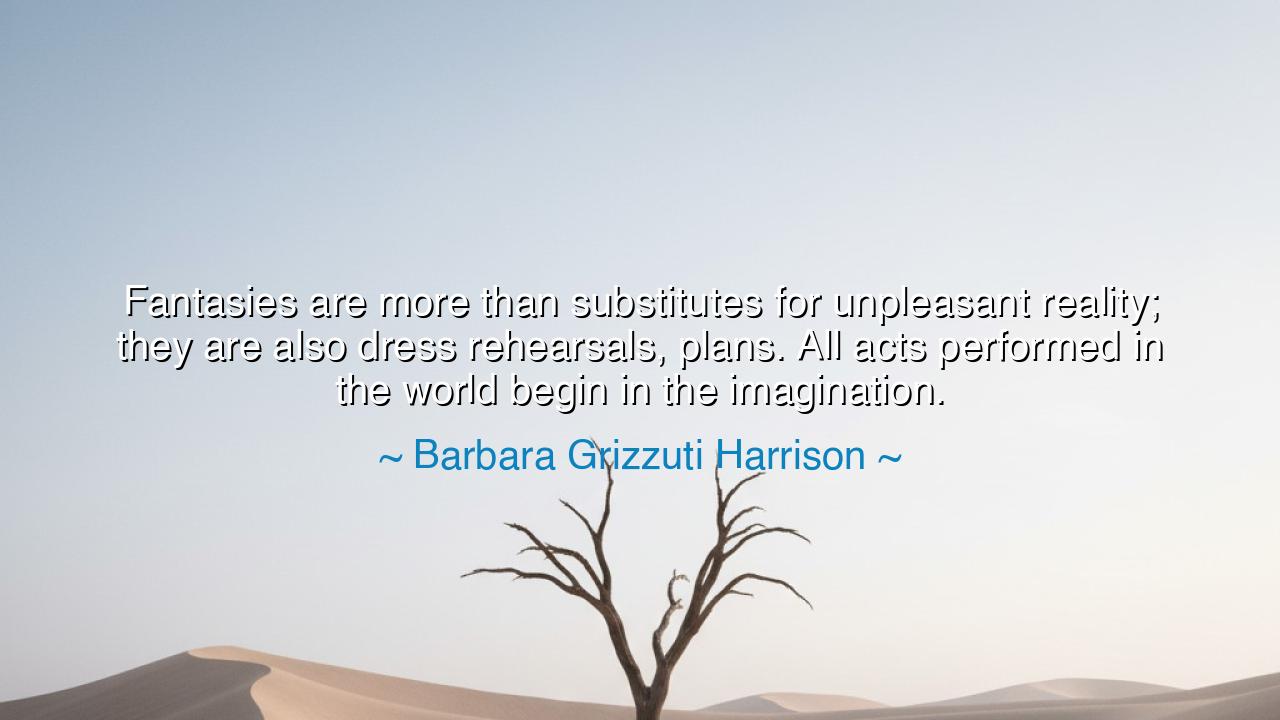
Fantasies are more than substitutes for unpleasant reality; they
Fantasies are more than substitutes for unpleasant reality; they are also dress rehearsals, plans. All acts performed in the world begin in the imagination.






“Fantasies are more than substitutes for unpleasant reality; they are also dress rehearsals, plans. All acts performed in the world begin in the imagination,” wrote Barbara Grizzuti Harrison, a woman whose spirit danced between realism and vision. In these words lies the ancient truth that all creation begins first in the invisible realm of thought. What we call fantasy is not mere escape, but the seed of action, the blueprint of what has yet to be born. Every empire, every poem, every invention that has reshaped the world began as a flicker in the mind — a vision unseen by others, but already real in the dreamer’s soul.
To the ancients, imagination was not play, but prophecy. They knew that what the spirit conceives, the body follows. A sculptor first sees the god within the stone before the chisel ever strikes. A general envisions victory before the first trumpet sounds. And so Harrison reminds us that fantasy is not weakness, but the beginning of will. The dreamer rehearses, in secret, the movements of destiny; and when the time comes, he acts them out in the world. Thus, to imagine is to prepare for creation — to whisper to the universe, “Let it be.”
Consider Leonardo da Vinci, that eternal symbol of the dreaming mind. Long before the age of flight, he drew wings; long before machines of war rolled across the earth, he sketched their forms in delicate ink. To his contemporaries, these were fantasies — strange curiosities of an overactive imagination. Yet centuries later, his visions became the skeleton of reality. What was once fantasy became the modern world. Leonardo’s imagination was not an escape from life, but a rehearsal for its transformation.
But Harrison’s words also carry a warning — that imagination is powerful only when it moves toward action. There are some who dwell forever in fantasy, mistaking dreams for deeds. Their castles remain in the clouds, never touching the soil. The ancients would say: imagination without discipline is a wind that scatters seeds but never grows a tree. True creation requires both vision and labor — the union of heaven and earth. To imagine is divine; to act is divine fulfilled.
Still, we must not scorn fantasy even when it feels foolish or distant. The one who dares to dream rehearses courage, compassion, and change. A poor child imagining themselves a scholar has already begun their education. A weary worker dreaming of justice has already kindled rebellion. Even love begins in imagination — in the unseen wish that another might understand our heart. Harrison’s insight is thus both humble and heroic: the mind that dreams is already preparing to live.
Let this be the lesson, then: cherish your imagination, but harness it. Do not cast it away as childish, nor let it carry you into idle illusion. When a fantasy visits you — an image of a better self, a more just world, a creation yet unborn — receive it as a divine rehearsal. Ask, “What does this dream demand of me?” Then act upon it. For the gods, it was said, speak not through thunder or fire, but through the quiet visions of the heart.
So, my friends, remember: every act of greatness begins in a dream. The hero imagines victory before the battle; the poet feels the verse before the ink dries; the reformer envisions freedom before the chains fall. Do not fear your fantasies. They are not your escape — they are your invitation to begin. Imagine boldly, and then rise to meet your own vision. For imagination is the womb of creation, and through it, every mortal soul partakes in the immortal art of making the world anew.






AAdministratorAdministrator
Welcome, honored guests. Please leave a comment, we will respond soon